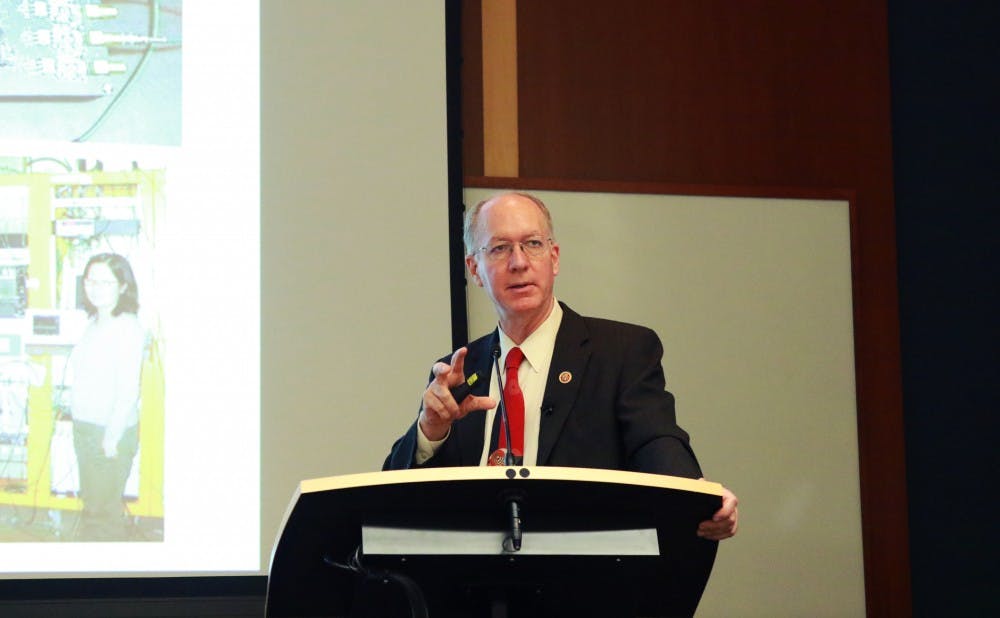Although physics, business and politics may seem like unrelated fields, one congressman has united all three in his lifetime.
U.S. Rep. Bill Foster of the 11th District of Illinois spoke about his interdisciplinary career as a businessman, scientist and congressman Thursday evening at a talk hosted by the Duke Initiative for Science and Society as part of its distinguished speaker series. In addition to his personal background, Foster addressed the country's economic trajectory and foreign policy. As one of the only sitting members of Congress who holds a Ph.D., Foster holds a unique political role that connects science to public policy.
“I may be over-reaching here, but I believe I’m the only member of Congress who has designed and built a 100,000-ampere superconducting power transmission,” Foster joked.
Foster addressed a range of current political issues related to his scientific expertise. He said that his background allowed him to brief politicians from both sides of the aisle about the scientific aspects of the Iran nuclear deal.
“Being a physicist, I share a collective guilt for the introduction of atomic technology into the world,” Foster said. “I’ve spent a decent part of my adult life musing about the right way forward—probably more than the average member of Congress. I believe that it should be the goal of the U.S. to strengthen the goal of the Non-Proliferation Treaty.”
Additionally, Foster touched on human genetic engineering, answering a question from the audience regarding the kind of legislation that should be passed to regulate the field.
The quickly-developing field will have implications for both the present and future, even if the science behind genetic engineering is still being perfected today, he said.
“This is the challenge of your generation to figure out,” he said. “Your children and probably you will compete in the workforce against people who are genetically modified. How do you explain to your children why they’re the only kids in their class who need eight hours of sleep when everyone else needs only three?”
Foster also described how he uses his scientific background unconventionally in analyzing economic data from the Great Recession, which began in 2007. Using graphs to demonstrate the increase in the number of available jobs, Foster argued that political facts do not always seem to match scientific facts.
“The political facts say that the [Economic Stimulus Act of 2008] failed,” Foster said. “It’s a pretty clear reading of all economic data that the stimulus was a success, but that’s a scientific statement.”
As the co-founder of the company Electronic Theatre Controls—which is responsible for the majority of Broadway stage lights and contributed to the lighting for the 2012 London Olympics—Foster also has a background in business, as reflected in his vote to bail out the Big Three automobile companies in 2008. Although he noted that his decision was an unpopular one, Foster said it was based on his business acumen and believes it was ultimately the right one.
“Most of the time you try to represent and do what the people who elected you really think, but there are times when we’re a representative democracy and you have to say ‘I’ve taken more time than my constituents to study this thing. I am not going to do what [they] want me to do,’” Foster said.
In addition, Foster gave insight into life as a congressman, noting that it is not as glamorous as some may believe. However, he noted that being a representative for Illinois is not without some perks.
“When we leave on Friday, if the president is also going home for the weekend, sometimes he gives us a lift,” he said.
Students in attendance said that they enjoyed the talk and thought that Foster provided an interesting perspective by bringing attention to the fact that there are relatively few scientists and businessmen in Congress.
“It really surprises me that there’s a lack of technical knowledge on the part of the people who are designing the policies that impact so many people,” sophomore John Lu said.
Sophomore Andrew Grover said that he thought Foster could have talked more about how being a scientist affected his experience in Congress.
“I felt like he talked about his life a lot as a scientist and a businessman and then he talked a lot about his life in Congress, but I would have liked to see a lot more cross-over between the two,” Grover said. “But I very much enjoyed his presentation.”
Get The Chronicle straight to your inbox
Signup for our weekly newsletter. Cancel at any time.

